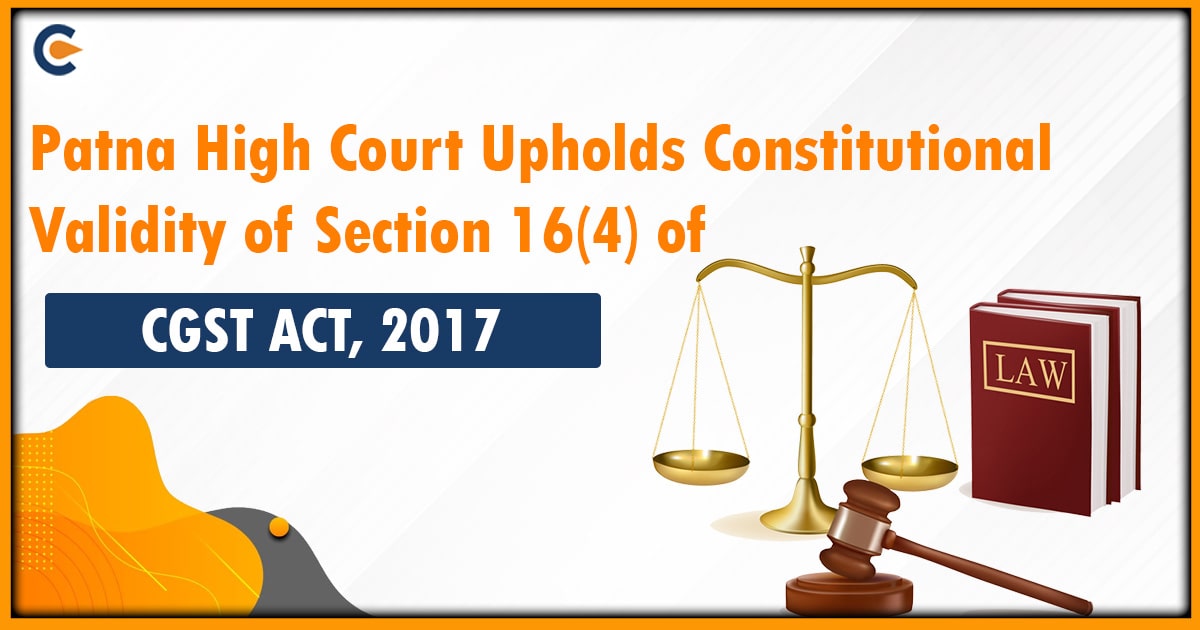The implementation of the CGST Act in India has resulted in significant changes to the country’s tax system. The adoption of the CGST Act has streamlined India’s taxation processes, leading to increased transparency and efficiency in tax collection. One crucial aspect of Section 16(4) of CGST Act is that it outlines the conditions for claiming input tax credit (ITC). For businesses operating in India, it is essential to have a clear understanding of the Act’s provisions, including Section 16(4) of CGST Act, to ensure compliance and avoid potential penalties.
This article explores a significant legal ruling recently issued by the Patna High Court in the matter of Gobinda Construction vs. Union of India [1]via the Secretary. The case primarily revolves around the interpretation and constitutional legitimacy of Section 16(4) of CGST Act, 2017, and its potential effects on Input Tax Credit (ITC). The court’s decision, dated September 8, 2023, tackled essential legal issues and carries substantial implications for taxpayers and businesses. The Hon’ble Patna High Court determined that Section 16(4) of CGST Act is constitutionally sound. It was concluded that this section does not infringe upon Article 19(1)(g)[2] and Article 300A [3]of the Constitution of India, nor does it contradict or undermine any fundamental rights protected by the Constitution of India.
Key Provisions of Section 16(4) of CGST Act:
- Eligibility Limited to Registered Persons: Section 16 (4) establishes that only registered individuals or entities have the privilege to claim input tax credit (ITC). This provision effectively bars unregistered parties from accessing ITC. Such a restriction is in place to prevent businesses that are not registered from exploiting the ITC system, which could potentially result in government revenue loss.
- Business Use Requirement: Section 16 (4) also stipulates that the goods or services must be employed exclusively for business purposes and not for personal use. This implies that any goods or services utilized for personal reasons are ineligible for ITC claims. This particular provision safeguards the ITC system, ensuring that claims are made solely for genuine business-related expenses and preventing any misuse or manipulation.
- Documentation Necessity: To successfully claim ITC, a registered individual or entity must possess appropriate documentation, including invoices, receipts, and other pertinent records. These documents must accurately detail the goods or services acquired, the corresponding tax payments, and the ITC amount being claimed. The maintenance of precise and complete documentation is essential for ITC claims, as any discrepancies or inaccuracies in the records can result in the rejection of the ITC request.
It’s important to note that Section 16 (4) of the CGST Act does have exceptions where ITC can be claimed even if the goods or services are not directly used for business purposes. To provide an example, if the goods or services are utilized in the production of taxable supplies, then the input tax credit (ITC) can be rightfully claimed. Conversely, if these goods or services are employed for carrying out exempt supplies or supplies with nil rates of taxation, claiming ITC is not permissible. Section 16(4) of CGST Act, further stipulates that a registered entity can only avail of input tax credit (ITC) if they have adhered to timely filing requirements for their GSTR-1 and GSTR-3B returns. This underscores the critical importance of punctual return filings for ITC eligibility. Additionally, if the supplier of goods or services fails to remit the collected tax to the government, the registered entity is barred from claiming ITC. It’s essential to note that Section 16 (4) of the CGST Act pertains specifically to the Central Goods and Services Tax (CGST) and the State Goods and Services Tax (SGST), excluding the Integrated Goods and Services Tax (IGST). To claim ITC under IGST, individuals or entities must adhere to the provisions outlined in Section 20 of the IGST Act.
Implications of Section 16(4) of CGST Act:
Section 16 (4) of the CGST Act carries several important implications for businesses in India, summarized as follows:
- Business Accountability: Section 16 (4) serves as a critical mechanism to ensure that businesses can claim Input Tax Credit (ITC) exclusively for legitimate business purposes. By doing so, it helps in curbing tax evasion and guarantees that ITC claims are tied to genuine business expenses. This provision fosters a sense of responsibility among businesses and contributes to transparency within the taxation system.
- Documentation Precision: Accurate and comprehensive documentation is of paramount importance when it comes to ITC claims. Any errors or inconsistencies in the documentation can result in the rejection of ITC claims. This necessitates that businesses maintain meticulous records of their purchases and expenditures. Small businesses, in particular, may need to invest in robust accounting systems to comply with this requirement.
- Compliance Obligations: To access ITC, businesses must adhere to the regulations delineated in Section 16 (4) of the CGST Act. This means businesses must not only understand these provisions but also strictly abide by them. Failure to comply can lead to penalties and legal repercussions, which can prove burdensome, especially for small enterprises.
Overall, Section 16 (4) of the CGST Act plays a pivotal role in ensuring that ITC is availed only for legitimate business purposes. It promotes transparency and accountability within the taxation system, yet it concurrently imposes rigorous demands related to documentation precision and compliance on businesses.
Facts of the of Gobinda Construction vs. Union of India
- The registered entity consistently filed monthly returns using Form GSTR-1 for the financial year 2018-19.
- However, the GSTR-3B returns for February 2019 and March 2019 were submitted after their respective due dates, specifically on October 23, 2019, and November 11, 2019.
- Consequently, the tax department issued a Show Cause Notice on February 20, 2020, invoking Section 73[4]. This notice disallowed the input tax credit (ITC) for February and March 2019 due to the delayed GSTR-3B filings.
- The Show Cause Notice also sought to recover taxes, interest, and penalties totalling INR 1,34,12,983.
- An order was subsequently issued under Section 73 of the CGST Act, 2017, citing the breach of conditions outlined in Section 16(4) of CGST Act same Act as the basis for denying the ITC.
- Dissatisfied with this decision, the registered entity appealed to the Additional Commissioner of State Tax (Appeal) in Patna and concurrently filed a Writ Petition in the Hon’ble High Court of Patna.
- The appeal was eventually dismissed, with the Appellate order upholding that the ITC claimed by the petitioner was inadmissible due to the late filing of GSTR 3B, which was deemed contrary to the provisions of Section 16(4) of CGST Act, 2017.
Issues of the case:
- Is Section 16(4) of CGST Act, 2017 constitutionally valid, considering its limitations on claiming Input Tax Credit (ITC) for the previous financial year beyond the specified due date, and does it infringe upon Article 14 and Article 300A of the Indian Constitution?
- Should Section 16(4) of CGST Act be regarded as a procedural provision incapable of superseding Section 16(2) of the CGST Act, 2017?
- Is it appropriate to interpret Section 16(4) of CGST Act in a manner that restricts the application of ITC limitations to invoices or debit notes received after the end of the financial year, beyond September of the preceding financial year?
- Does GSTR 3B fail to meet the definition of a return, and does the retrospective amendment of Rule 61(5) of the CGST Rules, 2017[1], categorizing GSTR3B as a return, contradict Section 39(1) of the CGST Act, 2017?
Judgment:
In Civil Writ Jurisdiction Case No. 9108 of 2021, the Hon’ble Patna High Court rendered the following judgments:
- The court drew upon the precedent set by the Supreme Court in the case of Jayam and Company vs. Assistant Commissioner & Anr[5], wherein the constitutional validity of Section 19(11) of the Tamil Nadu Value Added Tax Act, 2006[6], was upheld. The Supreme Court emphasized that when concessions are granted through statutes or notifications, strict compliance with the conditions specified is mandatory to avail such concessions. Therefore, the right to benefit from Input Tax Credit (ITC) is not an inherent right of dealers but a concession granted under Section 19. Consequently, the provision cannot be deemed arbitrary or violative of the dealer’s rights under Article 19(1)(g) of the Constitution.
- The court opined that the petitioner’s arguments do not hold ground because Section 16 of the CGST Act uses unambiguous language. The grant of ITC under Section 16(1) of the CGST Act is contingent upon meeting the necessary conditions outlined in various provisions, including Section 16(4) of CGST Act.
- It emphasized the presumption of constitutional validity for legislation, placing the burden of proof on those who challenge its validity to demonstrate otherwise.
- The court conclusively held that Section 16(4) of CGST Act is constitutionally valid and does not violate Article 19(1)(g) and Article 300A of the Constitution of India. Moreover, it does not conflict with or derogate from any fundamental rights guaranteed by the Constitution of India.
Changes and Interpretations of Section 16(4) of CGST Act:
This amendment has brought significant relief to taxpayers seeking to rectify their input tax credits. Previously, the time limit for claiming input tax credit for an invoice or debit note was linked to the due date for filing GSTR-3B for the month of September following the end of the financial year to which the invoice or debit note pertained. Other conditions related to the annual return were not relevant, primarily because the due date for the annual return always fell after the September GSTR-3B due date.
However, with the recent amendment, the time limit for claiming input tax credit for an invoice or debit note has been extended to the 30th day of November following the end of the financial year to which the invoice or debit note relates. This change has removed the previous restriction, allowing corrections to be made in the return for September or earlier months, and providing more time for filing within the GSTR-3B due date in September.
Conclusion:
The denial of Input Tax Credit (ITC) and the imposition of taxes, interest, and penalties for non-compliance with the provisions of Section 16(4) of CGST Act can have severe financial consequences for registered business owners. Furthermore, this situation can result in double taxation, where both the purchaser and the supplier are taxed on the same goods or services due to procedural errors.
It is widely recognized that Section 16(4) of CGST Act does not allow the claiming of ITC related to the preceding financial year in case of delayed filing of the subsequent year’s September month GSTR-3B. In matters related to taxation statutes, a strict interpretation is typically followed. However, considering the complexities and challenges associated with return filing in the early years of GST implementation, including technical glitches, frequent amendments, the meticulous process involved in determining eligible ITC, the taxpayer’s level of understanding regarding the flow of credit through a dynamic return like GSTR-2A, and other related factors.
Read Our Article: A Complete Outlook On Section 23 Of The CGST Act 2017











